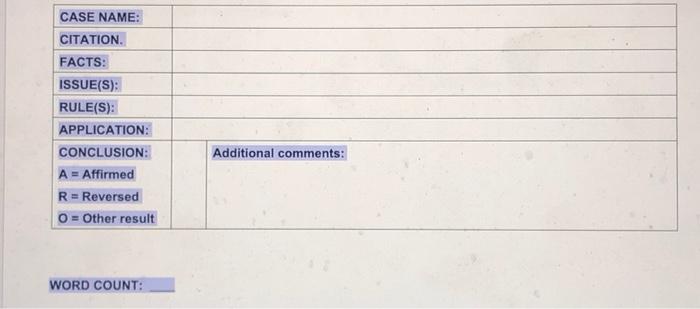Question
THE ASSIGNMENT: Write an analysis of the case of Luber v. Luber , 418 Pa. Superior Ct. 542 (1992), 614 A.2d 771, using the FIRAC
THE ASSIGNMENT:
Write an analysis of the case of Luber v. Luber, 418 Pa. Superior Ct. 542 (1992), 614 A.2d 771, using the FIRAC (Facts, Issues, Rules, Application, Conclusion) method. Please use the template provided below to organize your analysis.
MAXIMUM 300 WORDS
Your assignment must be submitted online before the deadline to be eligible for the maximum point score.
A copy of the case, edited specifically for this assignment, is provided below.
Included in the FIRAC CASES folder of the Canvas website for this course is a Memorandum on how to do a FIRAC analysis. The memorandum contains a link (How to do a FIRAC Analysis) that connects to an article containing a more detailed description of FIRAC methodology written by a law professor. That article goes into more depth than you need to complete this assignment, but it may be helpful.
The FIRAC CASES folder also includes the analysis I did for the Nelson case. It is there for your reference in case it may provide you with some guidance.
Additionally, in the HOMEWORK file, you can find the Instructor Examples I have posted for the previous Homework assignments this quarter.
This assignment will count for up to 5 points if turned in before the deadline, as follows:
Facts: 1 point
Issue/s: 1 point
Rule/s: 1 point
Application/s & Conclusion: 2 points
Barbara Greenblatt LUBER v. I. Michael LUBER, Appellant
418 Pa. Superior Ct. 542 (1992), 614 A.2d 771
Superior Court of Pennsylvania.
Before BECK, JOHNSON and HOFFMAN, JJ.
JOHNSON, Judge.
In this appeal, we are asked to determine whether the terms of an agreement orally placed on the record before a Master may be enforced as a binding marital settlement between parties in a divorce action. Here, I. Michael Luber (Husband) appeals from an order which granted Barbara Greenblatt Luber's (Wife) Petition for Order to Comply with Terms of Agreed Settlement and also awarded her counsel fees and costs. We affirm.
The parties were married on June 17, 1967 and separated on September 5, 1986. Wife filed for divorce in 1987. On August 30, 1990, a hearing was scheduled before a Master on the economic issues raised in the divorce proceedings. After several hours of negotiations, the terms of an oral settlement agreement were set forth on the record.
Following the parties' oral recitation of the settlement terms, both Husband and Wife were questioned by the Master and both indicated their understanding of the settlement terms and agreed to those terms. The Master indicated that, following the parties placing their settlement agreement on the record, a document reflecting that agreement would be drafted by counsel.
On October 31, 1990, Wife filed a Petition for Order to Comply with Terms of Agreed Settlement. Following a hearing, the trial court granted the petition and awarded counsel fees and costs to Wife.
Husband appeals from that order, alleging that the trial court erred in granting Wife's petition to enforce the property settlement agreement. We disagree.
Husband maintains that the terms placed on the record before the Master were merely proposals and concepts for a future contract and that there was no agreement as to all terms that were to be included in the marital settlement agreement. However, the record in this case fails to support Husband's contentions. After the parties had placed all the terms of the agreement on the record, the Master engaged in a colloquy of the parties.
Because both Husband and Wife, upon questioning by the Master, stated that they understood the terms of the agreement and gave their unqualified assent to the agreement, we conclude that the record supports the trial court's finding that both parties "understood and consented to the Agreement put on the record before the Master on August 30, 1990."
Husband further asserts that, because the parties contemplated the addition of "boiler-plate" language at the time of drafting, the oral agreement was incomplete and, therefore, unenforceable at the time it was placed on the record before the Master. We disagree. As long as the oral agreement contained the essential terms of the marital settlement, it could be enforced, despite the fact that additional terms were to be added to embellish the agreement when it was reduced to writing. . . . The record supports the trial court's finding that "[t]he agreement placed on the record and the colloquies following thereafter clearly show that the parties agreed upon the essential terms of the Settlement Agreement, [and] intended them to be binding between them. . . . We, therefore, will not disturb this finding on appeal.
Husband next contends that even if there were a valid agreement existing between the parties, his performance should be excused due to legal impossibility. Husband maintains that he is unable to obtain the necessary financing to meet the obligations of the marital settlement agreement and, as such, his obligations under the contract should be excused. We find this argument to be meritless.
Husband maintains that his inability to obtain the necessary financing renders it impossible for him to perform his obligations under the marital settlement agreement. [But] the theory of legal impossibility or impracticability is based on an objective standard and will not apply if a performance remains practicable and is merely beyond a particular party's capacity to render it. In order to prevail under the theory of [impossibility], Husband must establish that the act contemplated under the contract -- payment of the cash settlement -- is incapable of being performed, rather than that he is incapable of performing it. [Restatement (2d) of Contracts 261; Craig Coal, (Links to an external site.)513 A.2d (Links to an external site.)at 439].
Here, Husband does not assert that performance itself under the present contract is impossible but merely states that, due to other financial obligations, he is unable to perform. As Husband's assertion merely indicates a subjective personal inability to perform his duties under the contract, it does not rise to the level of legal impossibility. We, therefore, are unable to grant the relief Husband requests under this theory. . . .
Accordingly, for the foregoing reasons, we affirm the order of the trial court.
Order Affirmed.

Step by Step Solution
There are 3 Steps involved in it
Step: 1

Get Instant Access to Expert-Tailored Solutions
See step-by-step solutions with expert insights and AI powered tools for academic success
Step: 2

Step: 3

Ace Your Homework with AI
Get the answers you need in no time with our AI-driven, step-by-step assistance
Get Started


